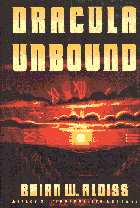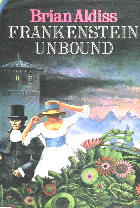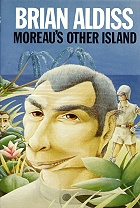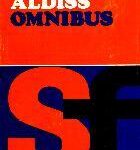Brian Aldiss Meets Frankenstein & Dracula
Exploring the Untraveled World
by Donna Ross Hooley
Brian Aldiss’ novels Frankenstein Unbound, Dracula Unbound, and An Island Called Moreau are of course inspired by Shelley, Stoker, and Wells; they are also influenced by Aeschylus’ Prometheus Bound, Shelley’s Prometheus Unbound, and Byron’s Prometheus. In addition, Aldiss’ novels allude to a surviving fragment of Aeschylus’ Prometheus Unbound. In Fragment 135, Aeschylus writes,
So in the Libyan fable it is told
That once an eagle, stricken with a dart,
Said, when he saw the fashion of the shaft,
“With our own feathers, not by others’ hands,
Are we now smitten.”
This ‘Libyan fable’ is found in the works of many writers, including Byron, Aesop, Edmund Waller, and Thomas Moore. In each of these three Aldiss novels, the fable is also retold. Victor Frankenstein creates his own Nemesis; in Dracula Unbound, where the climactic confrontation between humanity and vampires takes place in Libya, protagonist Joe Bodenland creates the time train that allows the vampires to bring humanity to its knees. In An Island Called Moreau, Undersecretary of State Calvert Roberts finds that his own branch of the government has funded and supported Dr. Mortimer Dart’s research; Roberts, the protagonist, discovers he himself has feathered the dart that wounds him.
Joe Bodenland in Frankenstein Unbound finds himself in an age where global race war is a reality and reality itself is threatened by timeslips, one more science project gone bad. A time slip sends Joe back to 1815 and the environs of Byron and company. In the mix is also Victor Frankenstein and his story brought to life. Joe says of the world’s—and his—desperate situation, “The Intellect has made our planet unsafe for intellect. We are suffering from the curse that was Baron Frankenstein’s in Mary Shelley’s novel: by seeking to control too much, we have lost control of ourselves” (12). Despite Joe’s efforts, Frankenstein’s tragedy plays itself out as Victor and the people he cares for are destroyed by Victor’s own creation. Once Joe confronts Victor at the scene of William’s death and Victor protests: “‘Truth was everything to me! I wanted to improve the world. . . . What man ever achieved what I have achieved?’”(42). Joe asks, “‘Isn’t your ambition itself a sin?’” (42). At one point, Percy Shelley argues with Byron, declaring that “‘machines will free all men’”(63). Byron is less enthusiastic about man’s machines and responds that “‘The question is whether machines strengthen the good or the evil in man’s nature. So far, the evidence is not encouraging. . .’” (63). In the same conversation, Joe says, “‘The greater the complexity of systems, the more danger of something going wrong, and the less chance individual will has of operating on the systems for good. . .’”(65), to which Byron replies, “‘Then we are headed for a world full of Frankenstein monsters. . .’”(65).
Obviously, efforts to make things better can make things worse, yet as Joe points out in a letter to Mary, though there are mistakes, there are benefits too: “All these advances have been real, even when dogged by the ills of which I told you. And they have brought about a change in the nature of people. . . People have been able to become softer. . . thanks to the great abundance for which technology is directly responsible” (89). However, the dangers of overpopulation as the result of better health care, of causing disease in some with the vaccine itself, of administering medications that turn out to be life threatening—all of these are real; as Aldiss writes in Trillion Year Spree, “. . .Frankenstein’s is the modern predicament, involving the post- Rosseauvian dichotomy between the individual and his society, as well as the encroachment of science on that society, and mankind’s dual nature, whose inherited ape curiosity has brought him both success and misery” (51). He also says the novel concerns “our fears about the two-edged triumphs of scientific progress. . .”(51). So Joe Bodenland in Frankenstein Unbound ruminates on Mary Shelley’s novel, trying to recall the ending of the nightmarish reality the timeslips have created for him: “Why should something dreadful come of good intentions? It seemed an immensely important question, and not only when applied to Frankenstein. Frankenstein was no Faust, exchanging his immortal soul for power. Frankenstein wanted only knowledge—was, if you like, only doing a bit of research” (47). What Byron writes of Henry Kirke White, a promising young poet who died, according to Byron’s note, “in consequence of too much exertion in the pursuit of studies…” (note line 831), could also be said of Victor Frankenstein:
Oh! what a noble heart was here undone,
When Science’ self destroy’d her favourite son!. . .
‘Twas thine own genius gave the final blow,
And help’d to plant the wound that laid thee low:So the struck eagle, stretch’d upon the plain,
No more through rolling clouds to soar again,
View’d his own feather on the fatal dart,
And wing’d the shaft that quiver’d in his heart. . . .
(English Bards and Scotch Reviewers 835-836, 839-844)
In Dracula Unbound, Joe Bodenland’s heroic adventures continue, as do unforeseen consequences. Bodenland Enterprises is struggling to convince Washington that Joe’s new invention deserves support, but the First Secretary of the Department of the Environment says, “‘It would be irresponsible simply to isolate considerable amounts of toxic waste in time with no clear picture of possible consequences. . . . Progress cannot be achieved at the expense of safety. You’re familiar with that concept. It’s what we call the Frankenstein Syndrome’” (18). She is correct but doesn’t know that the damage has already been done; Joe has that horrifying truth revealed to him much later by Dracula himself: “‘In your near future, where you came from, your government in Washington will forbid your toxic waste-disposal scheme as being too dangerous. Your inertial invention will lapse and be forgotten . . . until we revive it. . . . It’s your principle that governs the existence of this train. . . .You yourself are the original inventor of time travel. You yourself are the instigator of the triumph of the Un-Dead. . .’” (226-27). Fortunately, Joe is able to dodge the arrow by using time travel to his advantage, wresting the F-bomb first from the last of humankind holed up in Libya’s Silent Empire and then from the vampires. A vampire named Ali explains when questioned that “‘It’s well known that the Fleet Ones cannot invent. . . . But when they seize on mankind’s destructive weapons, the Fleet Ones can copy them. . .’” (211). Joe uses the F-bomb on the assembled vampire race, making his best effort to set things right. He faces a similar problem and uses a similar solution, time travel, to rescue his beloved Mina from Death himself. Mina, whom Joe sometimes calls Birdie, is a vampire when their son Larry is forced to thrust a stake through her heart; it is her own flesh rather than her feathers that finds the target.
The bird image is also a part of the confrontation in Libya between man and vampire. Joe is explaining to a young Captain that the Captain should spare Joe’s life because Joe plans to drop the bomb he’s stolen from the Captain’s superiors on the vampires. Joe says, “‘You see your little imprisoned bird there? If it were free and had a nest full of chicks, don’t you reckon it would defend its nest if attacked? Even if the attacker was an eagle, the finch would do its best’” (219). The Captain doesn’t buy this defense, and only the timely arrival of the train saves Joe from certain death. He winds up with the bomb on the train, a prisoner of the vampires. The vampires then destroy the guard post, all assurances to the contrary disregarded as Joe said they would be when he was traded for a promise of safety. Joe says, “‘Sorry about the little bird. . .’” (222).
Dracula Unbound also develops the idea that syphilis, that great sexual scourge of the days before penicillin, is as much the subject of Stoker’s novels as is the sensual and deadly Count. Stoker, who suffers from syphilis, asks the doctor in charge of Renfield’s institution if he feels pity for his patients; Stoker has told the doctor he is doing research on VD for a novel he is writing. Renfield is a tertiary stage syphilitic. The doctor replies, “‘Pity? No. None. They have brought their punishment on themselves. That’s obvious enough, isn’t it?’” (80). Yet Joe can fix Stoker’s ills too, as if by magic, for what is time travel if not magic? Stoker sees what else it is, and he tells Joe he must eventually destroy the train. Joe protests, “‘I can’t destroy it. It’s too precious’” (271). However, Joe does destroy the train in the end, for as Stoker says, “‘You must destroy it. . . . you would be entirely responsible for travel through time. You’d be another Frankenstein. And you would know that at some point the train would pass into Dracula’s hands. That’s what must never happen” (272). What Joe is persuaded to turn from is described in Aesop’s The Eagle and the Arrow: “The haft of the arrow had been feathered with one of the eagle’s own plumes. We often give our enemies the means of our own destruction.”
Global war with imminent worldwide destruction is also the setting of An Island called Moreau. Undersecretary of State Calvert Roberts is a castaway on Moreau Island, where Dr. Mortimer Dart, his assistants Hans, Heather, Da Silva, and Warren, and the genetically produced beast men suffer the consequences of a monstrous perversion of natural order. Dart reveals that he has been created by progress without safety; he was a Thalidomide baby, and has gone through life crippled, armless and legless. Roberts ponders what’s to be done when he returns to Washington: “It was not hard to understand how an intelligent man afflicted by his disabilities might be obsessed with the function of those disabilities and their cause. . . . Dart would have as strong a drive as any man to comprehend the mysteries of genetic structure and programming. . . . So I arrived at the point where I decided that what he was doing might possibly be of value to the world, and that he must immediately be prevented from doing it. Was there a contradiction there?” (63). Roberts has been blind to a number of contradictions, some of which are brought to his attention by Jed Warren, a navy man assigned to the government project that is Moreau Island. Warren says, “‘there’s quite a lot of junk around supplied direct by the U. S. Forces. One of their nuclear submarines calls here with fresh supplies every other month. Who do you think built this here power unit? Dart and me. . . ? It comes out of the long pocket of the American government. . .’” (99). Roberts is shocked, but he realizes, “I had known for some while” (100). He finds out that Heather is on assignment as well, as Dart’s bodyguard and assistant; she begs him to save Dart’s program, and tells him she now knows “‘You’re no enemy agent, you’re just the goddamned blundering shipwrecked politician you always claimed to be’” (130). She tells him why they thought he was lying: “‘You see, we’re funded here by your department—the Department of State. We assumed that if you were who you claimed to be, you’d have known all about Moreau Island all along’” (132). The truth is a shock to Roberts, who thinks, “How deluded I had been. . . And I was to blame for much that had happened. . . In a flash of terror, I saw myself back in Washington, turning up the Moreau file, issuing my blanket condemnations—only to find my own rubber-stamp signature on the original authorization. . .” (136). Roberts escapes via helicopter, but Dart escapes the island as well, with some of his beast men and Heather, in a government submarine. The future, as always, is uncertain. In their last conversation, Dart reveals to Roberts that his most recent creations, his SRSRs, “‘are, in fact, our survival kit into the future; they may even replace us’” (141). Roberts is outraged: “If this monster was to be believed, then I was witnessing the culmination of the Frankenstein process. . . a time could be visualized in the near future when the natural order would be entirely supplanted by the unnatural. The arguments of logic, with appeals to progress and the necessity of survival, were employed by Mortimer Dart much as they had been by Frankenstein and, for that matter, by McMoreau” (141). And so the great American eagle has supplied Dart with the means to supplant mankind, and in the words of Thomas Moore, the people may well
See their own feathers pluck’d to wing the dart
Which rank corruption destines for their heart. (Corruption)
In Frankenstein Unbound and Dracula Unbound, Joe Bodenland is the mythological hero who stands against corruption; Frankenstein’s monster and his bride die at Joe’s hands, and it is Joe who defeats the vampires and destroys the time train in Dracula Unbound. He is Joseph Campbell’s hero with a thousand faces, who “journeys through a world of unfamiliar yet strangely intimate forces, some of which severely threaten him. . . some of which give magical aid. . . . he undergoes a supreme ordeal and gains his reward. . . . The final work is that of the return. . . The boon that he brings restores the world” (The Hero with a Thousand Faces 246). In Frankenstein Unbound, Joe reports that “it seemed as if a new man, fitted for decision and adventure, had taken control of me” (23) and that “. . . I felt myself in the presence of myth and, by association, accepted myself as mythical. . .”(28). In Dracula Unbound, Stoker asks Joe, “‘Do you long to be a hero?’”(127). After a discussion in which Joe says “‘My shrink certainly thinks I long to be a hero. . .’” (127), Stoker declares “‘We must fight it together. We’ll be heroes, the heroes we dreamed of. . .’”(131). Despite Joe’s initial reservations, they set out on their journey, accompanied by Stoker’s gardener Spinks, the noble savage, and together they restore the world.
Thus Joe is cast in the role of a futuristic Ulysses who travels through both space and time, a man of reason who, facing one desperate situation after another, must trust his intuitions. He acts on the premises stated by Shelley’s god of skepticism, Demogorgon, in Prometheus Unbound: “All spirits are enslaved which serve things evil. . . ” (2.4.110) and “the deep truth is imageless. . .” (2.4.116). The central truth of Shelley’ skepticism, “that ultimates cannot be known or portrayed” ( The Oxford Anthology of English Literature note 433), becomes evident as Joe is forced to reassess his values as he tries to meet his responsibilities to family, to friends, to himself, and to humanity. Inevitably, these responsibilities are in conflict; Dracula Unbound begins with Joe missing his son Larry’s wedding to Kylie because of Joe’s work, and the developing crisis aborts the newlywed’s honeymoon when Joe needs their assistance. At the end of the novel, Kylie, the avatar of feminine intuition, is at odds with Stoker’s gardener Spinks, the representative intuitive noble savage, as the group votes on the crucial decision of whether or not they should use the F-Bomb to destroy the vampires. Joe, Stoker, and Larry vote yes, while Mina votes no, but is just concerned that the bomb won’t work, changing her vote to yes when Joe explains that the bomb will create what is in their time the Hudson Bay and so obviously worked. Kylie votes no, but her choice is based primarily on principle; she says, “‘Mine is a religious objection, as you might expect. . . . An evil weapon like your F-bomb cannot destroy evil. It can only propagate it’” (260-61). However, Spinks offers an intuitive solution: “‘There’s a time comes to all of us when we are forced to do something we’d rather not, in the hope and prayer that it will bring about a greater good. There’s good wars and bad wars, good causes and bad causes. I say this is a good war in a good cause. Drop the bloody thing and let’s go home’” (261). Kylie doesn’t change her vote, having been “‘brought up to believe that human beings shouldn’t have power of life and death over others” (262).
Our hero Joe, however, routinely exercises the power of life and death over others, relying on his individual judgment, informed by principle, experience, and intuition. As he says to Stoker, “‘We must save ourselves. Paradox, Bram’” (238). He acts out of necessity; when Stoker protests Joe’s decision to explore the Silent Empire, saying “‘don’t you know the difference between heroism and insanity?’” (195), Joe gives him “a grin . . . . There was nothing to be done but visit the city” (195). In another crucial scene, Dracula has Joe in a torture chamber, and the predator tells the story of the prisoner stretched naked before them, the once great human scientist Alwyn whose escape attempt failed and whom Dracula says “‘has been impaled on this table through many millennia’” (229). Later, after yet another escape himself, Joe tells Stoker, “‘I have a duty to discharge’” (243), returning to the torture chamber to kill Alwyn, whom Joe thinks of as “pinned like a sullied Prometheus to his rock of torture” (244). After completing this Herculean task, Joe finds that “Dracula’s terrible speech in this place, in which he had revealed the inevitable attitude of the predator to the prey, remained vivid. . .Once more he had committed an act of violence in defense of what he saw as right; but where ultimate judgment lay in such matters he did not know” (245).
As Joe demonstrates, however, the ultimate judgment lies with the individual, and it is individuality that is the hallmark of mankind. He thinks of the vampires as being “as alike as . . . animals, as sheep or other livestock. No real individuality. . . . the characteristic that set humanity apart from even higher mammals. . . That great moment of development, the waking of the individual spirit, must be fairly recent. . . . Bodenland was not much used to considering his inner self. . . Yet he was aware of an inner consciousness, detached from daily happening, which seemed to regard him” (174). Joe is a hero, and his decisions first imperil and then redeem the world. Joseph Campbell once said in an interview that “Myths inspire the realization of the possibility of your perfection, the fullness of your strength. . . . Slaying monsters is slaying the dark things. Myths grab you somewhere down inside” and when his interviewer remarks that “In this sense, unlike heroes such as Prometheus or Jesus, we’re not going on our journey to save the world but to save ourselves,” Campbell replies, “But in doing that, you save the world. The influence of a vital person vitalizes, there’s no doubt about it. The world without spirit is a wasteland” (The Power of Myth 148-49). Bodenland is the vital hero of Frankenstein Unbound, facing off with the Frankensteins, of whom Joe once thinks “they could have been members of the House of Atreus” (36), but he is the leader of a band of heroes in Dracula Unbound, including Stoker, who says he is on a hero’s quest, and Spinks, who “had remarked that he would like a spot of adventure”(188-89)). One of the greatest acts of heroism in either Bodenland novel, however, is that of an unsung hero, an individual in a desperate situation who acts to save nameless prisoners from the horror of drowning in their cells. One of those prisoners is Joe Bodenland: “Splashing through the dark flood, I was again throwing myself at the door when a key turned in its great lock and it opened. Who set me free—warder or prisoner—I have no idea. But there was someone at least in that dreadful place who had a thought for others besides himself” (93). In contrast to the empathy and compassion of this heroic deed performed by a commonplace man is the indifference of the educated, privileged Victor Frankenstein: “‘I have my own affairs, Bodenland. Yours mean nothing to me. People murder and get murdered—so they have done since the world began. It’s one of the things that must be altered. But I’m too busy to concern myself with your affairs’” (105). What Frankenstein does not grasp is expressed by Shelley’s Spirit of the Hour’s rejoicing when the New Day in Prometheus Unbound alters the thing that must be altered, which is men like Victor Frankenstein:
None, with firm sneer, trod out in his own heart
The sparks of love and hope till there remained
Those bitter ashes, a soul self-consumed,
And the wretch crept a vampire among men,
Infecting all with his own hideous ill;
None talked that common, false, cold, hollow talk
Which makes the heart deny the yes it breathes. . .
(3.3.144-150)
A man of common, false, cold, hollow talk is Calvert Roberts, far more a gullible Gulliver castaway on Moreau’s Island than one of Campbell’s universal Ulysses, although Hans and various beast people address Roberts as “hero.” He is the equivalent of Prendick in Wells’ novel, of whom Aldiss says in Trillion Year Spree “perhaps it is just that Prendick is a commonplace little man, as Gulliver was a commonplace little man and Alice a commonplace little girl” (126). Aldiss also comments on Wells’ “lifelong avoidance of drawing lead characters with whom readers will uncritically identify and thus be lulled into acceptance of whatever is offered” (120). Readers do recognize that Roberts is often blind both to intuition and to overwhelming evidence. Not only does Roberts have to admit that “I had managed to ignore the dreadful realities round me” (62) but he never expresses regret for his sexual fling with the Seal People, one of whom is a physically normal five-year-old girl. Roberts in fact considers taking the girl with him as he plans his escape. He is a man capable of a breathtaking lack of empathy, saying to Dart as the man’s horrifying deformity is revealed, when Dart speaks of a life of humiliation, “‘You don’t need to explain how mysterious are the ways of God, who communicates through suffering very often’” (39). Yet he is horrified at the reality of Moreau’s Island, reaching the conclusion that “The way of redeeming myself was to act now, to try to fulfill the rest of my plan. . .” (136-37). And it is Roberts who says to Dart’s assistant Warren, “‘I agree that many aspects of human life have always been wretched. Sometimes it seems that the most promising advances of science merely leave us with more problems. . . but you have thrown your lot in with an experiment which promised nothing but misery from the outset. How can you possibly defend that?’” (101-02). Roberts achieves only partial success, not Campbell’s Mythological Hero’s triumph, no “boon that . . . restores the world. . .” (The Hero with a Thousand Faces 246). Though the research compound is destroyed and Roberts escapes via helicopter, the submarine Dart is on also escapes, “and all its dangerous knowledge with it, heading for a world that thought it needed such knowledge” (156). As Aldiss writes in Trillion Year Spree in reference to Mary Shelley’s Frankenstein, “Knowledge brings no guarantee of happiness” (51).
In Shelley’s Prometheus Unbound, the Spirit of the Earth speaks of “the dull sneer of self-loved ignorance, /Or other such foul masks, with which ill thoughts/Hide that fair being whom we spirits call man. . .” (3.3.43-45), and Byron in his Prometheus writes that “Man is in part divine,/ A troubled stream from a pure source. . .” (47-48). The poets express the dual nature of man, his struggles with himself and his possibilities. Though the conflicts in man and the complexity of society endlessly complicate life, it is good to know that sometimes, men can do the right thing and save the day, even if it is only one day. It is also true that the facets of our nature cannot be logically reconciled; as Tennyson writes in Ulysses, “that which we are, we are”(67). However, because man can be a thinking, civilized being, guided by principles tempered with intuition, empathetic in the face of indifference, he is obligated to strive to be so. To do otherwise is to go against natural order, to corrupt the nature of man. Our resolve must be the same as Kylie’s when she finds her husband Larry, Joe’s son, drunk and weeping in a pool of vomit: “She had to stand by him, to try to induce vision in him—if not for Larry’s sake, then for her own. You could not live isolated; you had to do something for others. Otherwise she’d be as dead as he was. . . What did vampires think about most of the time? Maybe they didn’t think. But what did Larry think about, when you came down to it? Girlie magazines, screwing, Wild Turkey, and 12X Cheesecake (Fruits of Forest Flavor) to Be Stored at 0° F. . .” (203-04). Surely it is best to strive to attain the virtues Aldiss ascribes to Wells, an “enquiring spirit” and an “ability to see clearly the world-as-it-is” (Trillion Year Spree 120).
Copyright © Donna Ross Hooley
ABOUT THE CRITIC: Donna Ross Hooley is an Assistant Professor of English at Ogeechee Technical College in Statesboro, Ga. She taught high school in Darien, Ga, before receiving her M.A. from Georgia Southern College in 1982. She taught at Georgia Southern University from 1982- 2000, and was GSU’s Wells-Warren Professor of the Year 2000. She is the author of two textbooks and has published several poems, and is a Big Fan of Brian Aldiss.








